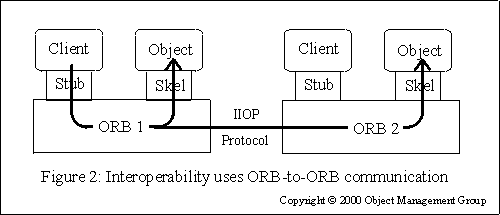
Distributed object computing extends an object-oriented programming system by allowing objects to be distributed across a heterogeneous network, so that each of these distributed object components interoperate as a unified whole. These objects may be distributed on different computers throughout a network, living within their own address space outside of an application, and yet appear as though they were local to an application.
Three of the most popular distributed object paradigms are Microsoft's Distributed Component Object Model (DCOM), OMG's Common Object Request Broker Architecture (CORBA) and JavaSoft's Java/Remote Method Invocation (Java/RMI).
The architectures of CORBA, DCOM and Java/RMI provide mechanisms for transparent invocation and accessing of remote distributed objects. Though the mechanisms that they employ to achieve remoting may be different, the approach each of them take is more or less similar.
CORBA remote invocation
